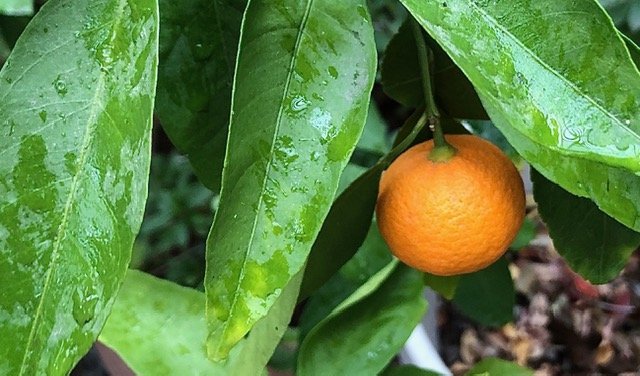
At a festival or in a backyard, citrus is a great crop

|
| Satsuma mandarins herald the local citrus harvest. Learn about growing citrus from the El Dorado County master gardeners on Nov. 20. (Photo: Kathy Morrison) |
The Mountain Mandarin Festival is coming, Nov. 19-21, which means the orange fruit of the moment is no longer pumpkins.
The Satsuma mandarins ripening now will be followed shortly by clementines, navel oranges, blood oranges, Cara Cara oranges, tangelos, and all the many other citrus fruits that will brighten the days until spring.
If you've ever wanted to grow your own citrus -- or already do but are perplexed by your plant's habits -- the El Dorado County master gardeners are here to help. They will offer a free online class, "Growing Citrus," 9 a.m. to 10:30 a.m. Saturday Nov. 20.
The class is appropriate for novice and experienced citrus gardeners. Master gardener Phyllis Lee will address citrus pests, handling cold weather, harvesting and other tips for success, applicable to other areas as well as El Dorado County.
Reserve a spot by signing up here .
The Mountain Mandarin Festival, which celebrates the crop and the growers of Placer County, will return to much of its usual level of activity this year, after dialing down last year in the face of coronavirus concerns. Hours are this year 11 a.m. to 5 p.m. Friday, Nov. 19; 9 a.m. to 5 p.m. Saturday Nov. 20, and 10 a.m. to 4 p.m. Sunday, Nov. 21.
Mandarin-based food of all kinds will be sold, in addition to bags and bags of fresh mandarins. (Some growers do sell online, by the way, if you are reluctant to buy in person.)
The festival also includes live music all three days, a Miss Mandarin pageant and, on Sunday, a Run for the Mandarins. Contests will not include cooking, but will include mandarin packing (Friday), mandarin juicing (Saturday) and mandarin peel-and-eat (Sunday).
The festival will be at the Gold Country Fairgrounds, 209 Fairgate Road in Auburn. Tickets are $10 general admission, $6 for seniors, and free for children under 12. Friday's admission is a special price of $5. A limited number of all-weekend passes are available for $19. Tickets can be purchased ahead of time online here ; an online fee is additional.
To keep everyone safe healthy, Placer County recommends that all festival attendees wear a mask.
The festival website, with many more details, is mandarinfestival.com .
-- Kathy Morrison
Comments
0 comments have been posted.Sacramento Digs Gardening to your inbox.
Food in My Back Yard Series
May 6: Maintain soil moisture with mulch for garden success
April 29: What's (already) wrong with my tomato plants?
April 22: Should you stock up on fertilizer? (Yes!)
April 15: Grow culinary herbs in containers
April 8: When to plant summer vegetables
April 1: Don't be fooled by these garden myths
March 25: Fertilizer tips: How to 'feed' your vegetables for healthy growth
March 18: Time to give vegetable seedlings some more space
March 11: Ways to win the fight against weeds
March 4: Potatoes from the garden
Feb. 25: Plant a fruit tree now -- for later
Feb. 18: How to squeeze more food into less space
Feb. 11: When to plant? Consider staggering your transplants
Feb. 4: Starting in seed starting
Sites We Like
Garden Checklist for week of May 11
Make the most of the lower temperatures early in the week. We’ll be back in the 80s by Thursday.
* Plant, plant, plant! It’s prime planting season in the Sacramento area. Time to set out those tomato transplants along with peppers and eggplants. Pinch off any flowers on new transplants to make them concentrate on establishing roots instead of setting premature fruit.
* Direct-seed melons, cucumbers, summer squash, corn, radishes, pumpkins and annual herbs such as basil.
* Harvest cabbage, lettuce, peas and green onions.
* In the flower garden, direct-seed sunflowers, cosmos, salvia, zinnias, marigolds, celosia and asters. (You also can transplant seedlings for many of the same flowers.)
* Plant dahlia tubers.
* Transplant petunias, marigolds and perennial flowers such as astilbe, columbine, coneflowers, coreopsis, dahlias, rudbeckia and verbena.
* Keep an eye out for slugs, snails, earwigs and aphids that want to dine on tender new growth.
* Feed summer bloomers with a balanced fertilizer.
* For continued bloom, cut off spent flowers on roses as well as other flowering plants.
* Add mulch to the garden to maintain moisture. Mulch also cuts down on weeds. But don’t let it mound around the stems or trunks of trees or shrubs. Leave about a 6-inch-to-1-foot circle to avoid crown rot or other problems.
* Remember to weed! Pull those nasties before they set seed.
* Water early in the day and keep seedlings evenly moist.